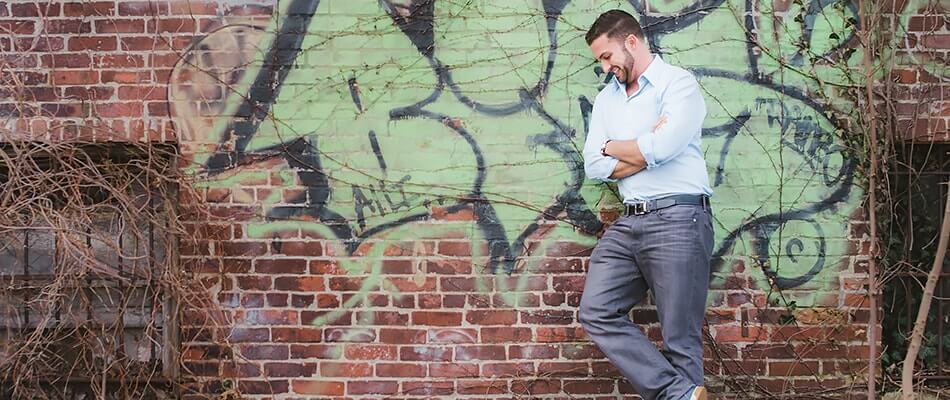Updated for 2020 with all-new recommendations!
Today, I want to introduce you to hand-selected some of my favorite books that I think you’ll love as much as I have.
All of these books have made important appearances in my life, especially over the last 12 years, when I quit my job while battling against depression and a crisis of identity.
From then and up to this day, books have been important teachers, guides, and friends in my personal and professional life.
If you’re looking for mind-blowing books that will expand your worldview, prompt you to reconsider what you think you knew, and altogether contemplate your life, I think you’ll enjoy what I have picked out for you below.
These books shave been really significant supporters in my personal growth, and I trust they can be for yours, too.
Happy reading,
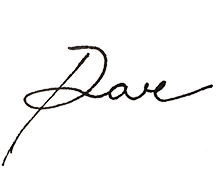
1. Tao Te Ching
By: Lao-Tsu
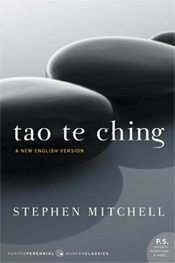
Tao Te Ching (pronounced “dao de ching”), which translates to mean “The Book of the Way,” is an ancient Chinese text comprised of 81 short aphorisms or contemplative teachings about finding and maintaining your path in life: a path that is noble, good, at peace with the world, and lived in harmony with all those around you.
Historically, the Tao Te Ching is said to have been written by one man named Lao Tsu (or Lao Tzu or Laozi), despite no one knowing for certain if Lao Tsu was one person, a collection of people (monks or philosophers), or a moniker taken on by different writers over generations.
The Tao is what inspired the Taoist school of spiritual thought. It details the path to “oneness” or wholeness — a sense of alignment and integrity to all of life and the universe.
This book has been one of the most influential and formative books I’ve ever come across in my life.
I can’t stop recommending it to people who are on a spiritual journey and seeking an alternative style of philosophy — one that runs somewhat counter to our Western social mores — to inspire their personal growth.
You’ll discover mind-bending concepts like following the path of least resistance, recognizing the power of giving to others as a pathway of happiness, and living in accordance “the Way” or non-resistance to life’s unfolding.
Embrace this work for yourself if you’d like a contemplative, open-to-interpretation teaching to help guide even deeper perspectives on how to help your life, deeds, and thoughts to unfold in integrity to the natural powers and forces of the universe.
2. The Hidden Life of Trees
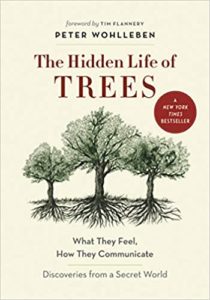 By: Peter Wohlebeh
By: Peter Wohlebeh
The Hidden Life of Trees by Peter Wohlebeh is a fascinating tale with a remarkable point of view: a true story of how trees are actually, possibly, probably, social creatures — in the ways that poets have suggested for centuries, that cutting-edge science and research is now beginning to confirm.
Narrated by a whimsical storyteller and lover of trees and nature, you join German forester Peter Wohlebeh as your personal witness into the world of trees.
This book will invite you to reconsider what you thought you knew not only about trees, but the natural world at large.
Did you that trees do things that we take for granted like “see” (or have the ability to assess the time of year and the seasons based on a perception of daylight hours), “smell” (or detect emitted chemicals in evolved warning systems from other trees, in response to predators), and “share” resources between related species in a subtle network of channels beneath our feet?
Prepare yourself… you might discover a whole new appreciation for Mother Earth, and begin to believe that there are more self-aware beings on our planet than we realize.
3. The Bhagavad Gita
Translated By: Eknath Easwaran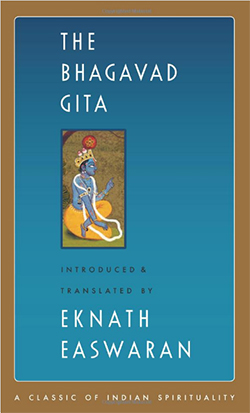
The Bhagavad Gita is an epic tale, part of ancient Hindu texts that form a cornerstone to the Indian spiritual philosophy.
Finding a resurgence in popularity over recent years (as yoga grows in popularity in the West), the Bhagavad Gita or the “Song of the Lord” is a story set upon the field of battle as our hero, Arjuna, contemplates the meaning of life, the quality of his soul and the mission before him on the eve of an epic war.
Though the war in the storyline has been a point of debate for centuries, it’s clear to many that this tale is not about the merits of war and killing but a vast, epic allegory for the battle we each wage in our own “everyday” lives.
This is the battle of choosing our good over cowardice; the battle to live a life of purpose and meaning in this, the one opportunity that we have; the battle to give nobly and serve deeply on behalf of others, in spite of our egoic wantings, worries, and selfish desires.
4. Think, Learn, Succeed
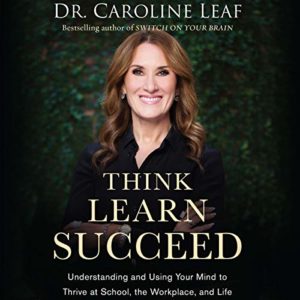 By: Dr. Caroline Leaf
By: Dr. Caroline Leaf
Despite being genuinely embarrassed by the cheesy self-help title of this book, Dr. Caroline Leaf’s Think, Learn, Succeed is a highly thoughtful and genuinely motivating treatment on how to help you use the power of thoughts to reprogram neural pathways in your brain, based in cutting-edge science and Dr. Leaf’s lifelong research.
Featuring the Gift Profile (a sort of personality quiz) to help you understand how you naturally prefer to learn and retain information as memory, this book will teach you how to learn more efficiently and how to develop positive thoughts into physical patterns of memory in your brain.
In other words, your intelligence is not pre-ordained, according to Dr. Leaf, but something malleable and subject to change based on how you manipulate your thoughts and develop your mind.
Check out this book to discover some of the latest research on brain science and well-developed tools to begin to take action to help your mental health, personal wellness, brain function, and memory. I loved it!
5. The Silk Roads
By Peter Frankopan
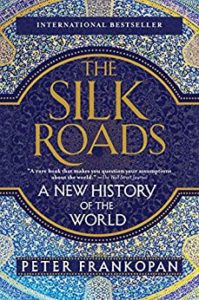 Peter Frankopan makes a big promise right in his book’s subtitle (“A New History of the World”) by offering readers an entire retelling of the history of human civilization through a new lens.
Peter Frankopan makes a big promise right in his book’s subtitle (“A New History of the World”) by offering readers an entire retelling of the history of human civilization through a new lens.
What’s the old lens? Well, in Western and North American educational systems, we learn of the unfolding of history through our own preferred and Western-centric unfolding: we begin with origins of our own society by beginning with ancient Greco-Roman societies before learning about European history as a segue into Colonial America.
In other words, we learn history by examining the history of us.
But is that necessarily the best, or most accurate, way of contextualizing the unfolding of all human civilization? It’s not.
Frankopan contends that the silk roads — the ancient trade channels from Eastern Europe through the Asian steppes and into modern-day China — are the “real” center of the map in the history of the world. And his book makes quite a compelling case.
As a history junkie, I adored this book and found it deeply educational and perspective-shifting. Frankopan also implies a certain perspective on human nature, too, that most of the major unfoldings and development in human history have not resulted from ideological and religious clashes — but, instead, from groups’ needs and desires for basic resources and economic interests.
The Silk Roads will make you rethink everything you thought you knew about the Crusades, the Holocaust, the modern Middle East, and where the world’s power may drift throughout the 21st century.
6. The Virgin’s Promise
By: Kim Hudson
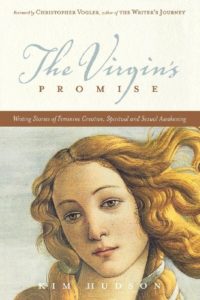 If you love the art of storytelling as much as I do, you’ll be familiar with a highly popular concept in modern storytelling and pop culture: the hero’s journey, as popularized by Joseph Campbell.
If you love the art of storytelling as much as I do, you’ll be familiar with a highly popular concept in modern storytelling and pop culture: the hero’s journey, as popularized by Joseph Campbell.
But is the hero’s journey really the be-all, end-all of storytelling?
Author Kim Hudson suggests that the hero’s journey is a bit overplayed, and most of all, a highly masculine-skewed approach to storytelling.
What we risk doing when we collectively tell stories through the exclusive lens of the hero’s journey is affirm a masculine-skewed value system that elevates “outward journeys” and acts of masculine heroism as the only socially-acceptable or esteemable stories that seem worth telling at all.
The Virgin’s Promise suggests that an alternative, but equally vital, sort of hero’s journey is the inward journey into one’s self.
Using archetypes and examples from feminine-centric concepts, Hudson offers pathways for understanding and telling stories from an inner-worldly perspective: retrieving, not just achieving, in a society already so achievement obsessed.
7. Shantaram: A Novel
By: Gregory David Roberts
Shantaram: A Novel by Gregory David Roberts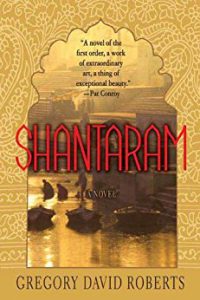 is an emotionally-stirring semi-autobiographical novel that details one man’s journey to find himself — while hiding from his past.
is an emotionally-stirring semi-autobiographical novel that details one man’s journey to find himself — while hiding from his past.
You’re alongside Lin, a prison-escapee who searches himself, for survival, and for a life he can call his own in modern-day Mumbai, India, during the late 1970s.
Not much one for novels, I found Shantaram to be a book that I could not put down.
As someone who has traveled to India twice, I fell in love with the vivid descriptions of life in India — they rang true to me and felt transporting to in many ways to my own experiences there.
I read Shantaram for hours at a time, savored its highs, and felt all its lows. Its characters are wildly compelling and real. I can’t recommend this novel enough if you want to be ushered into a wild, yet somehow not “fantastical,” tale of crime and redemption, romance and heartbreak, and more.
8. Eastern Body, Western Mind
By: Anodea Judith
9. Iron John
By: Robert Bly
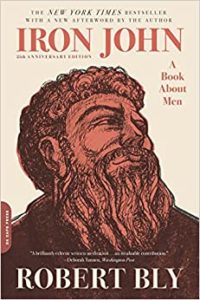 Iron John is a book about what it means to be a man through the lens of the Grimm fairy tale character, the Wild Man. Correlating this mostly-forgotten archetype from ancient mythology, the inner “Hairy Man” guides one boy through the eight stages of male growth.
Iron John is a book about what it means to be a man through the lens of the Grimm fairy tale character, the Wild Man. Correlating this mostly-forgotten archetype from ancient mythology, the inner “Hairy Man” guides one boy through the eight stages of male growth.
Bly encourages men to examine their inner selves while calling upon society to return to important myths that help people everywhere learn how to embody their most noble selves.
In particular, Iron John revolves around guiding men of all ages to examine what it means to become a proper, whole man in modern day life.
To be totally honest, books about masculinity and manhood are not my cup of tea. I’ve never found men exploring masculinity to be an interesting or worthwhile topic.
However, I really enjoyed the internal conversation sparked within me by this book, and it inspired me to rethink some ideas around healthy and balanced masculinity.
As a fan of myth and archetype, Iron John sparked imagination and drew a lot of parallels to my own “stages of male growth.” Ultimately, I recommend this book as an opportunity to rethink healthy and balanced male energies in a world that does need more men to be in healthier relationships to themselves.
10. Walls: Travels Along the Barricades
By: Marcello Di Cintio
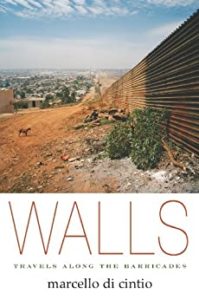 Why do people build walls? Why do we keep building them, and consistently celebrate when they fall?
Why do people build walls? Why do we keep building them, and consistently celebrate when they fall?
Marcello Di Cintio’s Walls: Travels Along the Barricades invites you along a real-life journey to some of the world’s most notorious walls — those separating political boundaries, religious affiliations, and historical divides.
With grace, poetic precision, and occasional touches of wit and humor, you see the world through Di Cintio’s eyes as you read this book — and meet dozens upon dozens of people who live in the shadow of walls to hear their stories and perspectives.
As you travel from Mexico to Jerusalem and Belfast to India with stops in between, Walls is a politically-appropriate book for group dialogue and personal consideration, especially during the current political atmosphere.
The book will challenge you to question the worth of walls that divide nations, peoples, and religions — and also, wonder what walls we each hide behind, if only in our own minds.
11. Man’s Search for Meaning
By: Viktor E. Frankl
Man’s Search for Meaning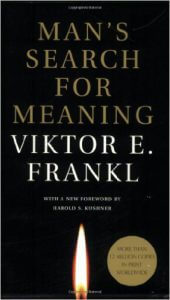 is a world-renowned exploration of how a human survives through one’s psychology, or perishes by it.
is a world-renowned exploration of how a human survives through one’s psychology, or perishes by it.
The true-life tale recounts personal the experience and lifelong vocation of psychologist and author, Viktor E. Frankl, against the bleakest, darkest backdrop in recent human history: his imprisonment at Auschwitz during the Jewish Holocaust of World War II Europe.
This book was a hard read. Gutting. Emotionally-depleting. And yet, so worthwhile.
The first half of the book is a very vivid, heart-wrenching recount of what Frankl saw and experienced in Auschwitz. His first-hand experiences — alongside thousands and thousands of men, who struggled to keep their strength along with their sense of humanity — inform Frankl’s later work as a logotherapist: a school of psychoanalysis that believes humans’ drive in life is for meaning.
If you believe the major driver of your life is for meaning — more than money, competition, or pure survival — you should read Man’s Search for Meaning, and be humbled by it, and incorporate that empathy into your mission to live with purpose.
12. The Abstinence Myth
By: Adi Jaffe, PhD
13. Charlatan
By: Pope Brock
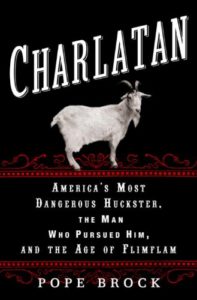 Prepare for yourself for a story so absurd that you’d never believe it if this book was fiction.
Prepare for yourself for a story so absurd that you’d never believe it if this book was fiction.
But this book is not a work of fiction.
Charlatan is Pope Brock’s comprehensive, journalistic analysis of one of America’s most dangerous ever hucksters: con man John R. Brinkley, who sold snake oil, performed dangerous and scientifically-disproven surgeries, and almost became governor in America in the early 20th century.
In this book, you’ll be introduced to an all-time great showdown between a con man and the truth-abiding crusader Morris Fishbein, who sets off on a lifelong journey to take down the quack doctor.
This book is mindblowing in the sense that it helps you understand the historical significance of con men who will stop at nothing to establish and retain power, influence, and wealth — even without shreds of truth, honesty, or integrity about them.
How do liars and frauds become celebrities, power brokers, even politicians? Charlatan shows you how.
14. The Power of Now
By: Eckhart Tolle
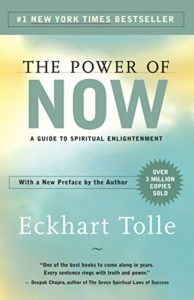
The Power of Now is a nondenominational spiritual book that introduces you to the concept of the mind being different than the self, and how to distinguish the mind from one own larger sense of self-awareness. This is an essential, foundational text and introduction to spiritual development, ego detachment, and self-help.
The Power of Now was recommended to me by a friend during a tough time when I was still in college. It truly inspired me to awaken to an incredible new sense of who I truly was, and who I truly was not.
It helped me settle my over-active mind during a period of anxiety and depression when coming out of a breakup. Altogether, the book helped me to feel purer and peaceful in my natural state of mind.
I’d be so bold as to say that this book helped me return to myself and my nature — a nature that is inherently good and loving.
While it is especially potent for quieting that “voice” within and helping us to instead live in the present moment, The Power of Now is a very powerful guide to spiritual realization and gaining a refreshingly new perspective on things.
15. The Alchemist
By: Paulo Coelho
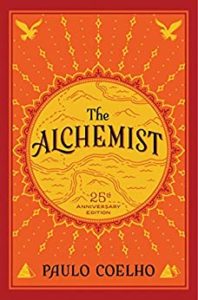
The Alchemist is a poetic and charming tale of self-discovery that effortlessly encourages you to undertake the pursuit of your own dreams — not because of wealth or fame, but because of the vital and soulful importance of fulfilling your own calling in life.
You’ll join the protagonist Santiago, a shepherd boy, who craves travel in the world in search of treasure. Will he ever find it? More importantly, will you find yours?
Equally as potent as a fun story full of adventure as it is an allegory for living a life of purpose, Coelho’s international best-selling tale
Pick up this book for the encouragement and motivation you never knew you needed.
